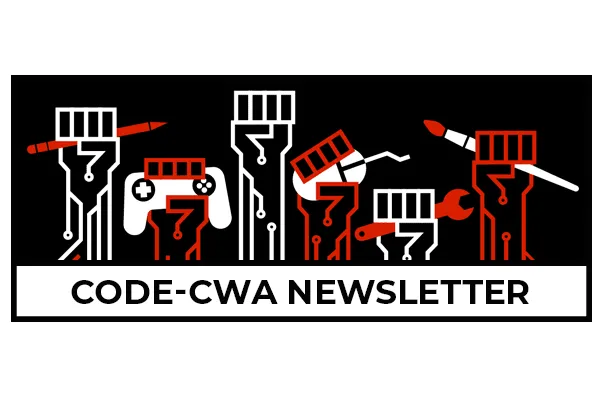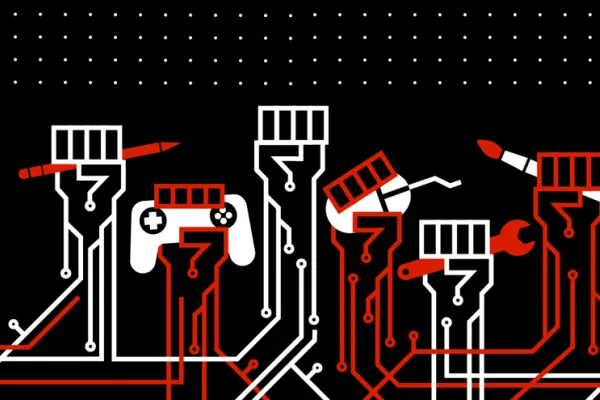CODE-CWA Newsletter: June 4

CODE-CWA Newsletter: June 4
“It’s disappointing and it’s hypocritical. There was even a New York Times editorial piece, from 2007, about recognizing unions when they have a majority of people signing cards in support,”
Nozlee Samadzadeh, tech worker with the New York Times.
A group of nearly 700 tech and digital employees at the New York Times would, if recognized, be the largest tech union so far. They have already voted to unionize as the New York Times Tech Guild with CWA. But as they are organizing, management is running tactics out of a union-busting playbook. While that hypocrisy is raging at the Times, Journalists at the Atlantic believe they have majority support to unionize with CWA's Newsguild too, time will tell how their management will react: will it drag its feet like the Times or be on the right side like NPR? At the end of April, NPR recognized a CWA union of 64 digital staffers.
Union organizing and conversations around unfair and exploitative practices are picking up steam in the tech industry. In this newsletter, we give you the latest on tech worker organizing, from the New York Times to Alphabet Workers Union at Google, and more! Through our support of workers across the tech, games, and digital industries we have seen a cultural shift as workers turn to each other to bring the change they seek. This commitment to building democracy in the workplace will impact all of us. Are you looking to organize your workplace? Reach out. We are ready to organize with you.
Events
On June 5, join us at a 12AM PST class where we talk about the union basics, the CWA organizing models, and some key ways to connect with co-workers through organizing conversations. Training is active and participatory. This is Class 1 in a series. Sign up here. Class 2 on Building the Committee will be offered at 10PM PST on Sunday, June 6. Sign up here.
While you're signing up for classes don’t forget to check out our new “Organizing Training” page on the CODE-CWA website. You’ll find a training program overview, additional resources to strengthen your organizing study, a briefing on your right to organize and more! Check it out here.
Worker News
Google union pushes company to drop deadnames from ID badges
The Alphabet Workers Union launched a campaign Tuesday to push Google to allow employees to use their chosen names on ID badges. The move comes after Phares Lee, a transgender man who works at a Google data center in South Carolina and is employed by security subcontracting firm G4S, asked to have his deadname removed from his badge and was denied. Read more on the Verge.
New York Times Workers Are Fed Up With the New York Times' Union-Busting
In April, when a group of more than 650 software engineers, product managers, and data analysts at the New York Times tried to unionize, leadership not only declined to voluntarily recognize their union, but began to hold mandatory anti-union meetings. (Management, of course, had known about the union months before it went public.) The strangest thing about this, say Times workers, was how contrary the current approach runs to the Times' own long-held positions on union recognition—a contradiction the paper has not addressed, and seems unwilling to.“It’s disappointing and it’s hypocritical. There was even a New York Times editorial piece, from 2007, about recognizing unions when they have a majority of people signing cards in support,” said Nozlee Samadzadeh, a software engineer who works on Oak, the text editor used by Times journalists. Read more on Motherboard.
In Crunch Culture Video Games Studios Are Burning Out Developers and Artists
As podcast producer Jordan Mallory once tweeted, and hopefully presciently, “I want shorter games with worse graphics made by people who are paid more to do less and I’m not kidding.” Crunch culture doesn’t refer to the practices within any single company, but rather those of the entire industry. Despite promises by Polish game studio CD Projekt Red that they’d avoid crunch during their latest production, Cyberpunk 2077, game news website Polygon reported that “Employees at CD Projekt Red […] have reportedly been required to work long hours, including six-day weeks, for more than a year.” The “non-obligatory crunch policy” proudly touted by studio co-founder Marcin Iwiński became quite obligatory for some employees, and the same crunch practices extended to the studio’s overseas contractors. Read more on Current Affairs.
Amazon’s Cost Saving Routing Algorithm Makes Drivers Walk Into Traffic
"The speed limits on these roads will often be 50-60 mph and we’re having to pull halfway off the road and then [walk across] ... oftentimes at night." If it were up to him, Mike said, he would never run across a highway with his arms full of packages. But the routing algorithm designed for its Flex app by Amazon's research scientists often makes it unavoidable. In North America and Europe, roughly 85,000 contracted delivery drivers rely on this algorithm to do their jobs. While crossing the street in a quiet suburban neighborhood is probably safe, doing so on a 50 mph highway can be deadly. Amazon delivery drivers who work in Florida, Illinois, Michigan, South Carolina, Tennessee, Indiana, and California described sprinting across the street—or the highway—to follow the Flex app's directions. Read more on Motherboard.
They Organized the First app-based Food Delivery March, Now They Are Doing More
Los Deliveristas Unidos, who organized the first app-based food delivery march, realized that they also need to be able to organize against the greed and the power of large corporations and tech companies. Workers have come together to demand essential rights, such as access to bathrooms, personal protective equipment, the right to refuse unsafe work and receive paid sick time and hazard pay. And they're doing it in one of the most powerful ways by lifting up their voices, building solidarity. Read more on Forbes.
Tech Workers Organizing Is Nothing New ... But Them Actually Forming Unions Is
Tech sector is still among the least unionized major industries in the country. But that's not for lack of trying. For decades, tech workers have faced consistent hurdles to organizing: lack of power on the job, workforces spread across the world, false narratives about working conditions, and staunch resistance from management. Robert Noyce, co-founder of Intel, once reportedly argued that “remaining non-union is essential for survival for most of our companies. If we had the work rules that unionized companies have, we’d all go out of business” More recently, labor organizers have succeeded at unionizing tech workers at a handful of companies, like Kickstarter, Google and Imperfect Foods. Read more on KQED.
This Week in Labor History
June 3, 1934: On this day in labor history, striking Toledo Auto-Lite workers ratified an agreement, securing a number of first gains. Workers won union recognition, wage increases, mechanisms to arbitrate grievances and demands, and the rehiring of all workers. Edison workers won big the next day with a 22% raise and union recognition. Historian Bryan Palmer notes, “These victories (ended) any mobilization for a general strike, but they paved the way for ongoing union victories in the automobile industry.” Before the year was out, 19 more auto-parts plants in Toledo would fall to union organizers.
Song of the Week
Nina Simone: Mississippi Goddam
Picket lines, school boycotts
They try to say it's a communist plot
All I want is equality
For my sister, my brother, my people, and me
Yes, you lied to me all these years
You told me to wash and clean my ears
And talk real fine just like a lady
And you'd stop calling me Sister Sadie
Oh but this whole country is full of lies
You're all gonna die and die like flies
I don't trust you any more
You keep on saying "Go slow!"
You don't have to live next to me
Just give me my equality
Everybody knows about Mississippi
Everybody knows about Alabama
Everybody knows about Mississippi, goddamn
CODE-CWA Newsletter: February 21, 2025

